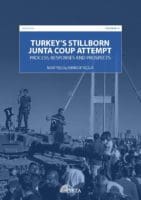
Turkey’s Stillborn Junta Coup Attempt: Process, Responses and Prospects
July 22, 2016Failure of the Coup Attempt in Turkey on July 15, 2016 highlights role of the Turkish people who resisted the coup.
This Article
Abstract
[caption id="attachment_2809" align="alignright" width="182"] Download PDF[/caption]
After the dramatic turn of events in the confusing hours of that thrilling and fateful night in July when an attempted coup in Turkey was thwarted, we know one thing much better than before: the power of the people using the Internet communication tools and platforms can be greater than the power of the military. In this paper we analyze Turkey’s stillborn military coup attempt by focusing on the internal process (personnel configuration, tactics and operational areas) of the military coup attempt and reactions of different political, military and civilian actors against the putschists. In addition to this, the paper focuses on the consequences and influences of the 15th July military coup attempt in the context of Turkey’s near political future.
Download PDF[/caption]
After the dramatic turn of events in the confusing hours of that thrilling and fateful night in July when an attempted coup in Turkey was thwarted, we know one thing much better than before: the power of the people using the Internet communication tools and platforms can be greater than the power of the military. In this paper we analyze Turkey’s stillborn military coup attempt by focusing on the internal process (personnel configuration, tactics and operational areas) of the military coup attempt and reactions of different political, military and civilian actors against the putschists. In addition to this, the paper focuses on the consequences and influences of the 15th July military coup attempt in the context of Turkey’s near political future.
Introduction
The latest military coup attempt of 15th July, which follows an infamous history of Turkish coups, proved that a terrorist organization can gain control of the idea of a military junta and exploit it to achieve its own ideological and political interests. Yet, the failure of the coup attempt solidified the concrete role of people in Turkish democracy.
The Turkish government achieved a perfect success in countering the coup attempt and forced the attempt to fail within 22 hours of being initiated. What was behind the success was the handling of the procedures of knowledge, decision and execution. Government officials obtained the factual information from different reliable sources and gained the knowledge superiority before the junta and this superiority helped Prime Minister Binali Yıldırım to call the incident “an attempt of a small group within the armed forces.” This diagnosis disclosed to the people that it was the junta -not the entire army- behind the attempt. It also untangled the distinction between the junta soldiers and the soldiers who are loyal to the constitutional order. Information superiority paved the way for the government to take the decision to call the people to take to the streets and defend democratic values. Decision-making superiority overcame the junta initiative and a hybrid counter-measure organization which was made of civilians- from the full spectrum of political outlooks-, police and military. Decision-making superiority was the key element to obtain the execution superiority, which was achieved by the well-handled coordination of divergent actors of police, military and local municipalities.
In this paper we mainly focus on the stillborn coup attempt by considering its internal process in terms of organizational, personnel, tactical and geographical aspects. More importantly, this analysis aims to put the failure of the coup on its operational conceptualism and we argue that the main cause of the failure were the cumulative efforts of multiple actors such as people, politics, government and different state institutions. The paper also draws attention to the consequences of the stillborn military attempt by contextually analyzing its effects on Turkey’s near future.
Subscribe to SETA Spot on Weekly Bulletin


























